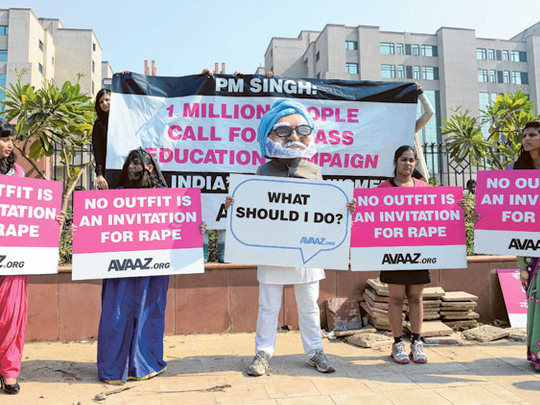
New Delhi: Five men went on trial on Monday over the fatal gang-rape of a student on a bus in Delhi as the victim’s father urged the special fast-track court to deliver swift justice and sentence her attackers to hang.
With the case being held behind closed doors and subject to a gagging order, it was left to one of the prosecutors to announce the start of the case to reporters packed outside the sessions court in New Delhi.
“The trial has begun,” Dayan Krishnan said. “The charge sheet has been submitted before the judge and the arguments will begin on January 24.”
The trial is being held in a special “fast-track” court in the capital set up to circumvent India’s notoriously slow justice system, with the victim’s family leading widespread calls for quick closure on the horrifying case.
The start of the trial was delayed until late in the afternoon on Monday by a failed application to overturn the gagging order while a lawyer for one defendant also sought to move the trial out of New Delhi.
The father of the 23-year-old victim said her family would rest only once the culprits were convicted and hanged and he urged judge Yogesh Khanna to complete his work quickly.
“We have finished the mourning rituals for my daughter in the village but our mourning will not end until the court passes down its verdict. My daughter’s soul will only rest in peace after the court punishes the men,” he said.
“It is the duty of the court and the judges to ensure that the final order to punish all the accused is handed down quickly and all the men are hanged.
“No man has the right to live after committing such a heinous crime.”
The assault last month on the medical student sparked mass protests across India — in particular in New Delhi which has been dubbed the country’s “rape capital” over the incidence of such attacks.
The five men face murder, rape, robbery, kidnapping and other charges, with prosecutors expected to demand the death penalty. A sixth suspect, who claims he is 17, will be tried by a separate juvenile court.
Defence lawyers say they will enter not-guilty pleas and accuse police of torturing the adult defendants — aged between 19 and 35 — to confess.
The woman, a promising student, whose father worked extra shifts as an airport baggage handler to educate her, suffered massive intestinal injuries during the assault on the bus in which she was raped and violated with an iron bar.
She died 13 days later after the government airlifted her to a Singapore hospital in a last-ditch bid to save her life.
In a move that could lead to a significant delay to proceedings, the Supreme Court on Monday agreed to consider a request to transfer the trial to a venue outside New Delhi.
M.L. Sharma, counsel for defendant Mukesh Singh, said it would be impossible for his client to receive a fair hearing in the city where the December 16 attack took place.
The application for a transfer will be considered by the Supreme Court on Tuesday.
V.K. Anand, a defence lawyer for another suspect called Ram Singh, asked the judge to lift the reporting ban on proceedings, but his request was refused.
“Crime is against society at large. Society has the right to know what happens in the court,” he argued when speaking to AFP.
Senior prosecutor Rajiv Mohan, who has vowed to seek the death penalty for the “heinous” crime, has said that he has “sufficient evidence” against all the accused to secure a conviction.
Police have gathered DNA evidence allegedly linking the defendants to the attack while the victim’s hospital bed declaration before her death and testimony from her 28-year-old companion are also set to be crucial.
India says it only imposes the death penalty in the “rarest of rare cases”. Two months ago, it hanged the lone surviving gunman from the 2008 Mumbai terror attacks — the country’s first execution in eight years.












